Invading Russian troops are stalled, but Ukrainian cities are still under bombardment and daily atrocities continue to be reported. Peace talks have so far failed to make any significant progress on a ceasefire, while Russian President Vladimir Putin has shown little sign of relenting.
The port city of Mariupol, once home to more than 400,000 people, has been reduced to columns of smoke, rising from burning residential buildings. Local authorities have reported that at least 80% of the city's residential buildings had been damaged or destroyed.
Civilians who escaped told Human Rights Watch they struggled to survive in below-freezing temperatures as Russian forces relentlessly attacked the city.
"Mariupol residents have described a freezing hellscape riddled with dead bodies and destroyed buildings," said Belkis Wille, senior crisis and conflict researcher at Human Rights Watch. "And these are the lucky ones who were able to escape, leaving behind thousands who are cut off from the world in the besieged city."
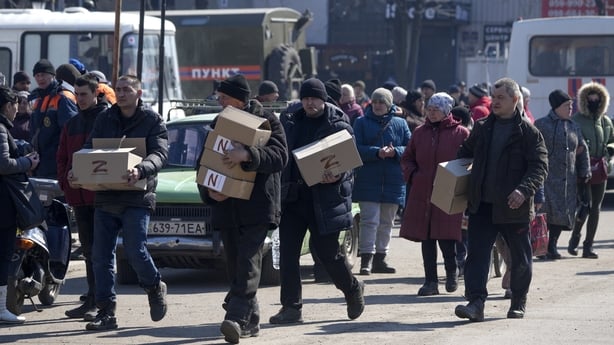
As stories of death and destruction continue to unfold, the question now is will Putin and other Russian leaders be held accountable, and for what crimes?
What is a war crime?
A war crime by definition is an act carried out during the conduct of a war that violates accepted international rules of war. There is a series of laws that govern how military forces are supposed to behave during situations of armed conflict.
International Humanitarian laws cover a broad range of regulations to protect civilians and soldiers, as well as to prevent wars from being lawless, and fought without any moral restraints. Serious violations that are classed as war crimes include, but are not limited to, deliberately attacking and killing civilians, killing prisoners of war, extensive destruction of civilian property without military necessity and deporting civilians.
Ukraine and its Western allies accuse Russian forces of targeting civilians indiscriminately. Russia denies targeting civilians and describes the invasion as "a special military operation".
What laws are in place to determine what are classified as war crimes?
International humanitarian law regulates the conduct of armed conflict and seeks to limit its inhumanity.
The cornerstone of International Humanitarian Law is the Geneva Convention. It was negotiated in the aftermath of WWII, when a series of treaties and protocols were agreed to limit or prevent human suffering in armed conflict.
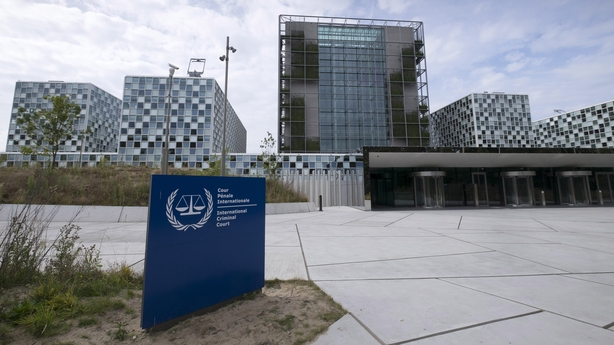
The list of war crimes set out in the Geneva Conventions was fairly short, but it has since been supplemented with additional laws. The most up to date and comprehensive list is the 1998 Rome Statute of the International Criminal Court. It contains a detailed list of what are considered war crimes by the states that have agreed to the treaty.
What crimes make someone a war criminal?
Dr Shane Darcy from the Irish Centre for Human Rights at NUI Galway says the use of 'war criminal’ is often used a bit flexibly.
"The term war criminal is not really a legal term, its one that’s used to describe someone who might have been convicted of war crimes," he said.
However, the colloquial use of the term may also be used in relation to someone convicted of crimes that don’t necessarily come under the category of ‘war crime’ even if they’re carried out during a war.
The International Criminal Court has jurisdiction over four categories of international crimes; War Crimes, Crimes Against Humanity, Genocide and the Crime of Aggression.
"All four of those categories of crimes have come up in the context of Ukraine for different reasons, not all necessarily because they have been committed, but the language of them has been used," said Dr Darcy.
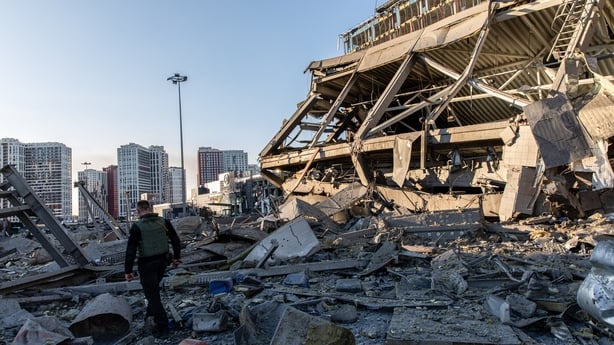
There's some overlap between Crimes Against Humanity and War Crimes whereby some of the same conduct might fit both categories. War crimes cover attacks on civilians, and this is also relevant under Crimes Against Humanity which covers what are known as widespread or systematic attacks on a civilian population.
"The concept of genocide was used by Russia as sort of a pretext to say they were invading to protect the population in Ukraine from genocide, and there's no evidence of that. Ukrainians officials have referred to the genocide of their people. But again, there's no real evidence that the crime of genocide is being committed by either side," said Dr Darcy.
The fourth category is Aggression, which covers crimes against peace and is effectively the invasion itself.
It's slightly different to the other three categories of crimes within the International Criminal Court, because not all states have agreed to give the court jurisdiction over the crime of aggression. Only about 40 states accept that the court has jurisdiction.
"The UN Security Council could ask the International Criminal Court to investigate a situation of aggression, but that will never happen when it's a Security Council member like Russia who is involved," said Dr Darcy.
Who decides if Vladimir Putin is a war criminal?
It’s a legal determination whether someone is a criminal and it should come from a judicial body. It’s a decision made in a relevant court, whether that’s a domestic court or national courts or in this case an international court such as the International Criminal Court.
US President Joe Biden has publicly called Vladimir Putin a war criminal. The Kremlin called Biden's remarks about Putin being a war criminal "absolutely unacceptable and inexcusable".
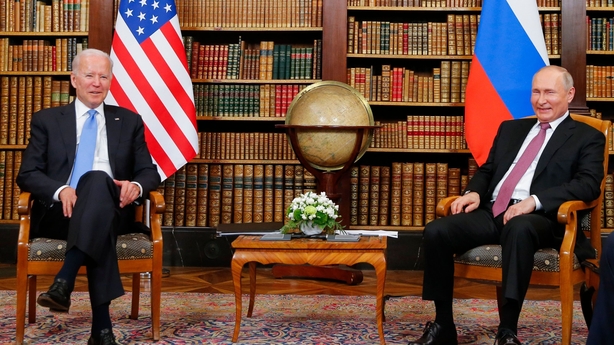
Dr Darcy said we wouldn't see politicians refer to someone who is suspected of criminality here at the domestic level as being a criminal for various reasons. But he added that at international level it is slightly different, because we don't have those rules around media coverage.
Can steps for justice be taken while a war is ongoing?
They can and they are. The International Criminal Court's chief prosecutor, Karim Khan, said this month he had opened an investigation into possible war crimes in Ukraine.
Neither Russia nor Ukraine is a member of the ICC and Moscow does not recognise the tribunal. But Ukraine has given its approval to examine alleged atrocities on its territory dating back to Russia's annexation of Crimea in 2014.
Fact finding and evidence gathering is already under way. The UN Human Rights Council is collecting information to provide to states and other policymakers. Ukrainian authorities are also gathering information at the sites of alleged war crimes.
"I've been in contact with a number of Ukrainian NGOs and they are working, documenting, interviewing witnesses, gathering information, gathering social media, there's organisations like Bellingcat as well who gather lots of footage and then try and verify it and are accumulating all that information," said Dr Darcy.
Where and how are war criminals tried?
In the case of this invasion, steps are being taken to look at options to find a court relevant to try Russian leaders in the aftermath of the conflict, whether its International Criminal Courts, some sort of hybrid model, or national authorities with some international support.
Trials could take place domestically in Russia or Ukraine. Some countries like Germany have their own laws and have started their own investigations.
There are certain war crimes that give rise to what's known as universal jurisdiction. This means regardless of where the crimes took place, some countries have laws that say they can prosecute people, even if the crimes aren't against their own nationals or on their territory, or by their nationals.
"The International Criminal Court would have jurisdiction over Vladimir Putin for war crimes or crimes against humanity taking place in Ukraine, but not for the crime of aggression, because neither Ukraine or Russia has agreed to be bound by the Rome Statute or agreed to the aggression amendments," said Dr Darcy.
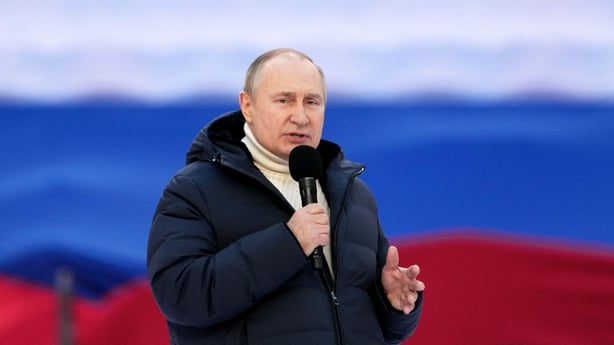
How likely is it that Vladimir Putin will be tried and prosecuted?
The chances are low. A prosecution of Vladimir Putin or other Russian leaders would face high hurdles and could take years.
Russia is a powerful country and a permanent member of the UN Security Council.
"No leader of one of the permanent five members of the Security Council, as far as I know, has ever been prosecuted for international crimes. And that's not to say they haven't been involved in violations of international law, we can find examples of that," said Dr Darcy.
The issuing of an arrest warrant can have a significant impact. The President of Sudan, Omar Al Bashir was indicted by the International Criminal Courts for war crimes and crimes against humanity over a decade ago. He’s now been deposed in Sudan and there have been discussions between Sudan and the ICC as to whether he will be handed over and tried.
In the case of Vladimir Putin, if he never leaves Russia, then he might avoid ever being put on trial.
"There'll be large aspects of what's happening in Ukraine that won't necessarily be prosecuted and war crimes as well. Not every act of violence that we see taking place in the conflict amounts to war crimes, so the thousands of soldiers that have been killed, many of those may have been killed lawfully.
"But in the context of an invasion itself, it is unlawful, so that's why there's a push for aggression to be tried. But again, the prospects are, I would say, middling to low," said Dr Darcy.







